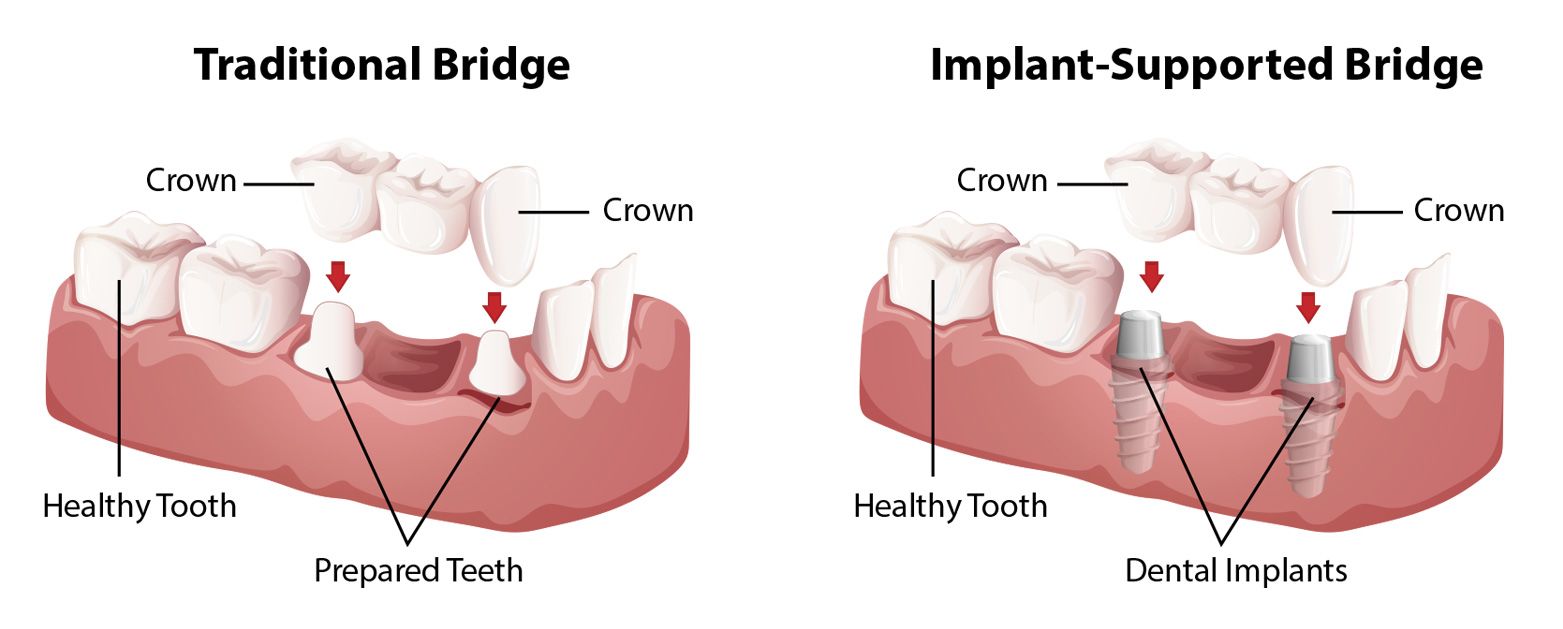Traditional vs. Implant-supported Dental Bridges: Which Is Better?
 Missing teeth can cause many problems when it comes to your dental health as well as the look of your smile. Thankfully our Pittsburgh restorative dentistry center offers advanced solutions for tooth loss. When a person is missing one tooth or a few teeth, a dental bridge tends to be the most ideal option.
Missing teeth can cause many problems when it comes to your dental health as well as the look of your smile. Thankfully our Pittsburgh restorative dentistry center offers advanced solutions for tooth loss. When a person is missing one tooth or a few teeth, a dental bridge tends to be the most ideal option.
Bridges come in many forms, from traditional removable/fixed bridges to bridges supported by dental implants. Let's compare and contrast these options so you can understand how dentists can help you.
How Traditional Dental Bridges Work
A traditional dental bridge is an appliance that helps fill the gap left behind by a missing tooth or multiple missing teeth. A bridge is custom-tailored to match the teeth adjacent to the tooth gap, ensuring a proper fit and seamless smile aesthetics. The dental lab that crafts the bridge will work to ensure the bridge looks just like your natural tooth structure.
A bridge can be held in place in one of two ways:
-
Traditional Removable Bridge – A traditional removable bridge is secure by bracing around the teeth adjacent to the tooth gap. The stability is achieved through careful impressions and custom crafting.
-
Crown-Supported Fixed Bridge – A crown-supported bridge consists of a false tooth/false teeth book ended by dental crowns. The crowns cap the patient's natural teeth that are on either side of a tooth gap. These bridges are less likely to budge than removable bridges.
How Implant-Supported Dental Bridges Work
Implant-supported dental bridges refer to a dental bridge that is fixed in place with dental implants. Dental implants are artificial tooth roots that are surgically embedded into the jawbone and gum tissue of a person's mouth. After the oral surgery, patients experience a process known as osseointegration, in which the dental implants fuse with the bone. This allows these artificial roots to function just like natural tooth roots, with a level of stability unmatched by other kinds of bridgework.
The Pros and Cons of Traditional Dental Bridges
The advantages of traditional dental bridges include:
- Affordable means of treating tooth loss
- Restored ability to bite and chew
- Improve smile aesthetics
The disadvantages of traditional dental bridges include:
- Chance of removable bridge slipping out of place
- Healthy tooth structure must be altered when using crown-supported bridges
- Cannot prevent gum recession or bone loss associated with missing teeth
The Pros and Cons of Implant-Supported Dental Bridges
The advantages of implant-supported dental bridges include:
- Unparalleled stability, making the bridge unlikely to fall out
- Prevents bone loss and gum recession
- Exceptional aesthetics and craftsmanship
The disadvantages of implant-supported dental bridges include:
- Much more expensive than other bridge options
- Patients may not be candidates due to oral surgery
- Small risk of implant failure due to various factors medical/lifestyle factors
What Type of Bridge Is Right for Me?
If you want to find out which dental bridge option might be most ideal for you, we can go over these matters during the consultation process. By weighing the pros and cons of your available treatment options, we can help you make the right decision for your dental health needs.
Learn More About Dental Bridges
To get more information about dental bridges and other treatment options for tooth loss and missing teeth, we encourage you to contact our advanced dental care practice today. Our team is here to help you smile with renewed confidence.


